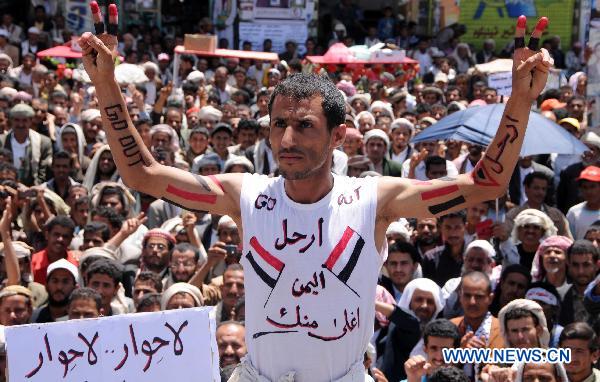Fresh protests hit Syria, Yemen
The Syrian and Yemeni governments Friday continued to seek ways to ease domestic tensions as protesters held fresh rallies to demand the resignation of their leaders.
Thousands of pro-reform protesters took to the streets in the Syrian cities of Damascus, Baniyas and Rastan.
The demonstrators called for the Syrian leadership to step down and lift a siege that had been imposed on the southern city of Daraa for 11 days.
Activists dubbed Friday's demonstrations a "Friday of Defiance," urging to resume the anti-government protests despite the intervention of the army, which has recently been deployed to Daraa, the heartland of the pro-reform protests, and other cities to end weeks of unrest.
Anti-government protests erupted seven weeks ago in Daraa, 100 km south of the capital Damascus, and spread to other parts of Syria. Syrian human rights groups said hundreds of civilians had been killed across the country.
The protests have also left more than 100 army personnel and security agents dead across the country. Syrian authorities have accused "armed terrorist groups and foreign conspiracy" of being behind the turmoil.
The Syrian Interior Ministry said 192 people who were involved in recent riots had turned themselves in to authorities late Thursday and Friday, bringing the total figure to 553. They had been immediately released after pledging not to organize or join protests again, the ministry said.
The ministry recently appealed to rioters to turn themselves in to the ministry before May 15, promising to release them without any punishment.
The ministry warned against any further demonstrations in the country without official permission.
The White House threatened to take "additional steps" against Syria if its government didn't show "significant change" in its dealing with the protests.
The White House "strongly" condemned and deplored the Syrian government's use of violence and mass arrests in response to ongoing demonstrations.
The White House said it was "abundantly clear" that the Syrian government's security crackdown wouldn't restore stability and stop the demand for change in Syria.
"It is also clear that false reform announcements, such as ending the emergency law but then expanding the scope of arrests without even the pretense of judicial warrants, also do not satisfy the demand for change in Syria," it said.
On April 29, U.S. President Barack Obama signed an executive order imposing sanctions against senior Syrian officials and government entities.
 0
0 







